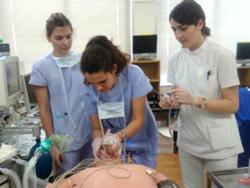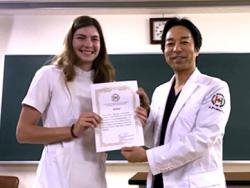国際・国内交流
Clara Fuchsさん(ビュルツブルグ大学 第3学年次)
Personal Report about my Clinical Training at Hyogo College of Medicine
Concerning organizational matters, I got a lot of help from Ms. Kyoko Torii. She arranged my rotations at the different departments. From February 26th to March 7th, I spent 2 weeks at the Department of Lower Gastrointestinal Surgery under Professor Tomita. The second half of my training, I observed procedures and surgeries at the Department of Neurosurgery under Professor Yoshimura.
I arrived on the same plane with the other international students on Saturday, February 24th. Ms. Torii welcomed us at the airport and brought us to the Guest House. She showed us the surroundings and explained where we could buy groceries. On Sunday, we went to Osaka to explore it by ourselves.
On Monday, Ms. Torii helped me to get to the Department and introduced me to my Professor for the next weeks. At first, Professor Tomita explained the routines and gave me an overview about the Department. There are surgeries on Monday, Wednesday and Thursday. On Tuesday and Friday, they see outpatients and perform contrast examinations.
Most patients have colorectal carcinoma and thus get surgery. So I could observe a lot of total colectomies and how the doctors make anastomosis. For me, it was the first time to see such a surgery. In Japan, they usually do laparoscopic surgery. The follow-up care in Japan is more thoroughly than in Germany.
I could observe many Stoma surgeries. The doctors form an Anus praeter either because patients showed signs of anastomosis leakage or Ileus. When I was at the out-patients clinic with the Professors, they examined the patients and asked about their symptoms. As I can’t speak or understand Japanese they translated and explained everything.
One of the international students from Bulgaria was at the Department of Anesthesiology. A doctor did a training with all of us. We had to do an anesthesia and he could control the dummy. For example, the blood pressure dropped and we had to choose the right medication for this situation. The model was really realistic and we could practice our skills.
After our day at the hospital, the Japanese students often invited us to have dinner. So we were able to try many different dishes – from Okonomiyaki and Yaki-soba, over Yakiniku and Sushi, to Shabu-Shabu. For sure Japanese food is really different to German dishes, but I enjoyed every meal!
The students not only took care of our culinary experiences but also made sure that we explore Japanese culture. They planned a tour to Kyoto and took us to different temples and shrines.
The other weeks I was at the department of Neurosurgery. Two other international students spent their time there with me. Normally, the day starts at 8 a.m. with a morning conference in English. For us, it was perfect as we could now understand the discussions and the patients’ stories. We learned how a brain tumor or an ischemic area looks like in CT and how we can see if an artery is occluded. They introduced new patients and explained the surgery from the day before as well as the upcoming ones. Every morning we could decide what procedures we are most interested in. Usually there were endovascular treatments at the interventional radiology center and different surgeries – such as spine surgery, aneurysm clipping and brain tumor surgery.
Here I got the chance to see open brain surgery for the first time.
Looking back, I am very happy that I got this unique opportunity to learn at Hyogo College of Medicine. It was a great experience for me and the doctors and students took really good care for me. I think the 4 weeks in Japan have a lasting effect on me.
Both neurosurgeons and surgeons from Lower Gastrointestinal surgery were really dedicated to what they are doing and did their best to help patients.

